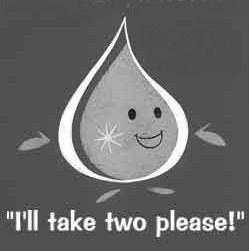Open letter to Matte Jet Ink Photo Paper
You know how attractive I find you. You wooed me from the glossy side of life years ago. So clean. So tasteful. Almost retro, but with a hip-edgy look. I don't think I could ever go back to the flashier, shiny gloss or even semi-gloss I had been involved with before meeting you.
But you vex me so! Would it be too much to ask for you to put some kind of marking or pattern on your backside? It's true there are many other photo paper products that don't, but don't you see Matte? They don't have to because their finish gives them away. I am not asking for anything showy or glitzy. I promise. I never would want you to compromise what you stand for. So what do you think?
No?
Not even a little tone-on-tone watermark or insignia? It would hardly be noticable. No really Matte! Who would know?
Oh you would know and that's enough. Puh-lease. What? Do you think you'd lose the 'artsy' market? I really don't think that should color your decision. Only poseur art-photographer types would dare complain.
There is something you must know then; and I hate to be the one to tell you this Matte. And I really hope it won't hurt your feelings, but it needs to be said: The true purists do not use Jet Ink Printers for their photos. No. They do not. And they never will. Oh I've done my research. Never.
Listen, just think it over and maybe get back to me. I won't leave you yet, I love you Matte, but this two-facedness, is wrong. It is misleading and it is putting a real strain on our relationship. Mull it over. Don't be a hater.
Weary but hopeful,
Desperate in Dallas









